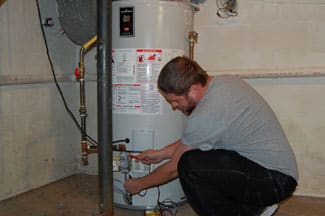Understanding Water Heater's Problems
Understanding Water Heater's Problems
Blog Article
The article in the next paragraphs in relation to Water Heater Repair and Troubleshooting is particularly entertaining. Read it for your own benefit and decide what you think of it.

Picture beginning your day without your regular hot shower. That currently establishes a bad tone for the rest of your day.
Every home needs a reputable hot water heater, however only a few know how to manage one. One easy means to maintain your water heater in top form is to check for faults routinely and repair them as soon as they show up.
Keep in mind to turn off your hot water heater before smelling around for mistakes. These are the water heater mistakes you are probably to encounter.
Water also hot or as well cold
Every water heater has a thermostat that figures out exactly how warm the water gets. If the water coming into your home is too warm in spite of establishing a convenient maximum temperature, your thermostat could be faulty.
On the other hand, too cold water may result from a stopped working thermostat, a busted circuit, or improper gas flow. For example, if you use a gas water heater with a broken pilot light, you would get cold water, even if the thermostat remains in excellent problem. For electrical heating systems, a blown fuse might be the offender.
Not nearly enough warm water
Hot water heater can be found in many dimensions, depending upon your hot water demands. If you run out of warm water before every person has had a bathroom, your hot water heater is also tiny for your family size. You must take into consideration mounting a bigger hot water heater tank or choosing a tankless water heater, which takes up less area and is a lot more durable.
Odd noises
There are at the very least 5 type of sounds you can hear from a water heater, however one of the most common interpretation is that it's time for the hot water heater to retire.
First of all, you ought to recognize with the typical appears a hot water heater makes. An electric heater may seem various from a gas-powered one.
Standing out or banging noises generally suggest there is a piece of debris in your containers, and it's time to cleanse it out. On the other hand, whistling or hissing audios might just be your valves letting some pressure off.
Water leakages
Leakages might come from pipes, water links, shutoffs, or in the worst-case situation, the tank itself. Over time, water will certainly rust the storage tank, and find its escape. If this takes place, you need to replace your water heater immediately.
Nonetheless, prior to your adjustment your entire container, make certain that all pipelines are in area which each valve functions perfectly. If you still require help identifying a leakage, call your plumber.
Rust-colored water
Rust-colored water means among your hot water heater parts is rusted. Maybe the anode rod, or the storage tank itself. Your plumber will certainly be able to identify which it is.
Lukewarm water
Despite just how high you set the thermostat, you won't get any type of hot water out of a heating system well past its prime. A hot water heater's performance might lower with time.
You will certainly additionally obtain warm water if your pipelines have a cross link. This indicates that when you switch on a tap, hot water from the heater flows in along with normal, cold water. A cross link is simple to spot. If your warm water taps still run after closing the hot water heater valves, you have a cross link.
Discoloured Water
Corrosion is a major cause of unclean or discoloured water. Rust within the water container or a falling short anode rod can cause this discolouration. The anode pole protects the storage tank from rusting on the within and must be examined yearly. Without a rod or an appropriately operating anode pole, the hot water quickly wears away inside the container. Get in touch with an expert hot water heater specialist to figure out if changing the anode rod will certainly fix the problem; if not, change your hot water heater.
Final thought
Preferably, your hot water heater can last ten years before you require a change. Nevertheless, after the 10-year mark, you may experience any one of these faults extra on a regular basis. Now, you must include a brand-new hot water heater to your budget plan.
How To Troubleshoot 3 Common Water Heater Problems in Twin Cities
The Water Heater Is Leaking
A leaky cold water inlet valve A loose pipe fitting A leaky temperature and pressure relief valve A corroded anode rod A cracked tank Turn Off Your Water Heater:
Shut off your gas water heater by turning the gas valve on the unit to the “OFF” position. Shut off your electric water by switching its power off at your electrical panel. Look for a two-pole breaker labeled “water heater” and turn it to the “OFF” position. Move the ball valve connected to the water heater to be perpendicular to the piping at a 90° angle. Look for the Leak:
Depending on whether the water is coming from the tank's top or bottom, you’ll want to look for the leak in different locations.
If the leak comes from the top of the tank, carefully look for water escaping from the cold water inlet valve or loose pipe fittings. Rusted hot and cold water valves can have loose connections with the tank, with water leaking out of them.
https://mspplumbingheatingair.com/blog/how-to-troubleshoot-3-common-water-heater-problems
I hope you enjoyed reading our excerpt about Common Problems with Tank Water Heaters. Many thanks for taking a few minutes to browse our blog post. Sharing is good. You won't know, you will be doing someone a favor. I take joy in reading our article about Water Heaters Problems.
Click Here Report this page